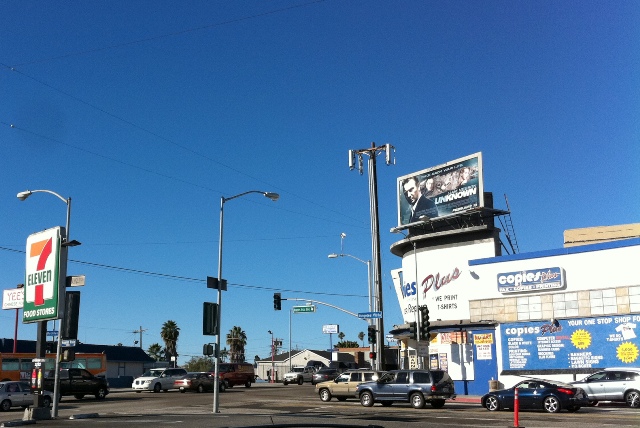 In the public right-of-way one block from an LA county site it was denied two years ago, T-Mobile recently installed a 52 ft. cell tower within LA city limits.
In the public right-of-way one block from an LA county site it was denied two years ago, T-Mobile recently installed a 52 ft. cell tower within LA city limits.
Windsor Hills residents in the unincorporated county area said they received no notice of any kind. Zoning investigator Andre Parvenu told a resident who inquired that the city of Los Angeles was not notified and issued no permits. Parvenue said the installation also exceeded height limits and violated other zoning restrictions.
Resident Sheila Smith is organizing a group to oppose this and a related string of T-Mobile sites in nearby county public rights-of-way. “If you are in a wheelchair, you can’t turn the corner at Angeles Vista and Slauson,” said Smith. “You have to go out in the street!”
Smith said that when crews showed up to start the installation, locals assumed the project had something to do with street drainage. “We feel we are a neighborhood under siege,” she said. “There are installations that have gone up near homes for several blocks.”
A similar T-Mobile installation along the public right-of-way in Sherman Oaks outraged citizens there who are still fighting to have it removed. Instead of working with the city and residents to find acceptable sites, T-Mobile is resorting to imposing equipment in the public right-of-way as allowed by current California Public Utilities Commission rules.

Pingback: LA County Neighborhoods Losing T-Mobile Fights; Israel Opposes Expansion of 4G Infrastructure | Sunroom Desk
Look folks, this is about 4G, and next year it will be about furthering more technological developments. The way the laws read and has traditionally been enforced, local law is superseded by State Law (which liberally allows for what it calls “utility poles”). However, CA case law usually uphold the rights of the communications companies *because*, where it conflicts with or duplicates local laws, it supersedes them (CA Pub Util Act S7901 and 7901.1).
I suggested to Paul Krekorian’ s Office, before he skated our of his office and into another, that they write more useful, modern, meaningful and specific laws designed for a new age in communication. It wouldn’t contradict the existing laws, and it wouldn’t duplicate them. They could just better define “utility pole”, and “incommode” to account for lowered property values and the new forms of corporate competition and fast-paced technological advances (4G and cell video) leading to a rash of cell phone towers, and consequently lowering property values. For example, the way the broad state and federal laws now read, once one tower is in, all competing companies have a right to be there. As you can imagine I got a pointless response from Krekorian’s people directing me to Assemly people, which was exactly -not* the point.
If the assembly-people write any new law, it 1) wouldn’t be local law and 2) would have to unmake federal and state regulation – something that is not going to happen.
Just know that there are plenty of agencies working on this including:
New Rules Project
EMR policy Institute
<a href="http://www.getthecelloutofhere.com/linksotherimptinfo.html"<http://www.getthecelloutofhere.com
There is case history in CA for ruling in favor of local interests:
http://www.dwt.com/LearningCenter/Advisories
And there is precedent for federal judges ruling in favor of FCC regulations (in other words – cel companies), but recognizing that local regulation my be a factor (see page 242 of The Communications Act: a legislative history …by Paglin et al. 1999):
Paglin et al. 1999
We need 1) new and 2) local laws.
It affects all neighborhoods and the problem is going to grow faster that legislators can imagine. Our council-people are failing us and the result is that, once this tower is in, it leaves us vulnerable to other companies wanting fair competition. Every time a new cell phone video upgrade comes out, more towers are needed. Competing companies won’t share access and for every one, and this invites more construction. Legally they have a right to be where their competitors are, and since most public communications acts were written in an age where companies could lease the poles to other companies (which cel companies do not practice), we are vulnerable and unrepresented as a community.
Make your council people understand your concerns. Make them understand they are not without the ability to affect positive change. Write new laws that regulate where these can be placed, and through what process.